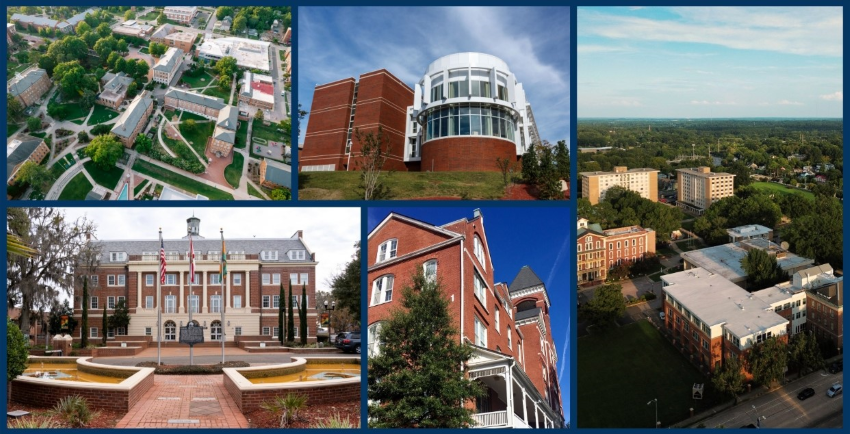
HBCUs near Self-Help branches
There are only a couple weeks left of homecoming season, which is a culturally significant time for Historically Black Colleges and Universities (HBCUs). It is an opportunity for students, alumni, and their families to come together in connection
and celebration rooted in resistance.
As with any homecoming, the event surrounds a fall football game, but HBCUs take it a
“step” further with a week of events, such as parades, step shows, performances, and more.
In this blog post, we will be discussing the history of HBCU homecoming, why it is an important part of Black culture, the typical traditions and events, and our HBCU Promise.
What Is an HBCU?
Before we explore the role of homecoming, let's take a moment to discuss the history of HBCUs.
The second Morrill Act of 1890 required states to provide land-grants for institutions for Black students if they were not allowed admission to previously established colleges and universities, which were generally only for white folks. This resulted
in more than 90 institutions of higher learning for Black students that were created between 1861 and 1900.
HBCUs are defined as “any historically Black college or university established prior to 1964, whose principal mission was, and is, the education of Black Americans....”
The History
An article by Levi Perrin for Word in Black frames homecoming as “a tradition born of necessity” that came to exist as a form of resistance. During Jim Crow, gatherings
of Black folks were considered a dangerous threat and were often interrupted (sometimes with lethal force). However, Black folks still chose to gather together in a variety of spaces where they felt safest – one of those spaces being the
campuses of HBCUs.
HBCUs were some of the first spaces where Black people could be formally educated and pursue intellectual freedom. They were (and are) a safe space for Black people to excel, which is why they became so important to Black communities as a place
for gathering. It was only natural to continue this tradition in a yearly display of support and connection for homecoming.
What started as a football game and alumni reunion has become a series of multi-day events that celebrate the HBCU experience and culture.
The Significance
HBCU homecoming is a celebration of Black joy and Black excellence in the face of continued systemic biases – it continues to build community, solidarity, and safety for the people attending. For many, it feels like a family reunion where multiple
generations come together and share their talents with alumni acting as role models and mentors to the younger generations of students.
Oftentimes, it may be the only time where Black people are surrounded by so many people who look like them - that representation matters and inspires growth and achievement.
The Traditions & Events
Every HBCU has a different set of events and traditions unique to their culture and history. Some common events that many HBCU homecomings consist of may include:
Alumni mixers – Many alumni look forward to homecoming and will use this time as an opportunity to connect with their fellow alums.
Step shows – Stepping is a rhythmic dance performance based on synchronized movements and has a long history in the Black community with deep roots in African traditions. The shows are often a focal point of many homecomings.
Parades – Vibrant and colorful parades with floats, bands, and school groups will wind their way through campus and the surrounding streets in this energetic display of creativity and spirit.
Concerts & music festivals – Some of the larger HBCUs have become known for their extravagant concerts and music festivals, featuring well-known musical artists.
The game – Many homecoming weeks center around a football game, which allows the fans, students, and alumni to unite in support of their team. While this is a common central point of homecoming, not all HBCUs have
football teams.
Tailgating – No homecoming is truly complete without tailgating. During homecoming, many HBCU campus grounds fill up with grills, tents, and music.
The halftime show – Many HBCU halftime shows are spectacles with impressive marching band displays and performances as well as amazing dance routines that get the crowds energized.
Our HBCU Promise

At Self-Help, we believe in supporting ownership and economic opportunity for all, which is why we are committed to supporting Historically Black Colleges and Universities (HBCUs).
In 2022, Self-Help launched the HBCU Promise+, which provides responsible products, services, and education for HBCU students, alumni, faculty and staff to reduce debt and achieve economic mobility.
This year, we extended that promise to the institutions themselves with our HBCU Legacy Initiative,
which includes a fund for project-based lending, a technical assistance program, and a program for financial literacy education and advisement.
Learn more from this recent interview with Dr. Shandra Jones, an executive at Self-Help:
We are grateful to call many HBCUs and HBCU alumni part of the Self-Help community. We wish all those participating a safe and joyous homecoming celebration!